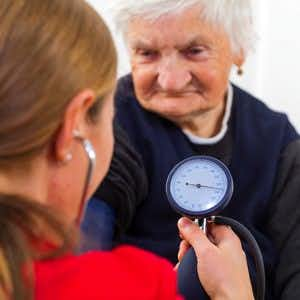
High blood pressure is acknowledged as the silent killer. That is not disputed. But new research from the UK suggests that doctors should pay attention to falling blood pressure in their older patients. The research was published in JAMA Internal Medicine (Delgado et al, JAMA Internal Medicine, online Dec. 4, 2017).
What Is the Meaning of Falling Blood Pressure Among Elders?
The scientists analyzed records from more than 46,000 Britons who died between 2010 and 2014. All were at least 60 years old. The data included general practitioners’ records on blood pressure, measured at nearly every visit.
The analysis shows that people had falling blood pressure for more than a decade before death. The drop in systolic blood pressure was more than 10 mm Hg for the majority of the individuals. This drop was not due to treatment for hypertension, although it was steeper for those with high blood pressure, atrial fibrillation, heart failure or stroke.
The scientists admit that they need more research to fully understand the causes of falling blood pressure. They suggest, however, that these findings may require doctors to pay attention when an older patient has a substantial drop in blood pressure.
Falling Blood Pressure Is Sending a Message:
In a related commentary, Dr. James Goodwin describes an elderly patient of his. She had been taking four drugs at high doses for many years just to keep her systolic blood pressure (the top number) down below 160. Then, over just three months, she needed fewer and fewer drugs. She was able to get her systolic pressure under 140 with just one drug. Naturally, the lady is thrilled. The doctor, on the other hand, is worried. Through her falling blood pressure, his patient is telling him, though she does not know it, that she is probably in the final few years of her life.
He muses:
“The challenge for physicians treating the very elderly is when to “let go,” when to stop urging more social engagement, more exercise, more food, and to realize that our patients are near death. No physician wants to clutter the last 10 to 20 months of a person’s life with irrelevant concerns and activities.”

